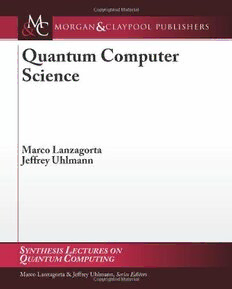Download Quantum Computer Science PDF Free - Full Version
Download Quantum Computer Science by Marco Lanzagorta, Jeffrey Uhlmann in PDF format completely FREE. No registration required, no payment needed. Get instant access to this valuable resource on PDFdrive.to!
About Quantum Computer Science
In this text we present a technical overview of the emerging field of quantum computation along with new research results by the authors. What distinguishes our presentation from that of others is our focus on the relationship between quantum computation and computer science. Specifically, our emphasis is on the computational model of quantum computing rather than on the engineering issues associated with its physical implementation. We adopt this approach for the same reason that a book on computer programming doesn't cover the theory and physical realization of semiconductors. Another distinguishing feature of this text is our detailed discussion of the circuit complexity of quantum algorithms. To the extent possible we have presented the material in a form that is accessible to the computer scientist, but in many cases we retain the conventional physics notation so that the reader will also be able to consult the relevant quantum computing literature. Although we expect the reader to have a solid understanding of linear algebra, we do not assume a background in physics. This text is based on lectures given as short courses and invited presentations around the world, and it has been used as the primary text for a graduate course at George Mason University. In all these cases our challenge has been the same: how to present to a general audience a concise introduction to the algorithmic structure and applications of quantum computing on an extremely short period of time. The feedback from these courses and presentations has greatly aided in making our exposition of challenging concepts more accessible to a general audience. Table of Contents: Introduction / The Algorithmic Structure of Quantum Computing / Advantages and Limitations of Quantum Computing / Amplitude Amplification / Case Study: Computational Geometry / The Quantum Fourier Transform / Case Study: The Hidden Subgroup / Circuit Complexity Analysis of Quantum Algorithms / Conclusions / Bibliography
Detailed Information
| Author: | Marco Lanzagorta, Jeffrey Uhlmann |
|---|---|
| Publication Year: | 2008 |
| ISBN: | 9781598297324 |
| Pages: | 125 |
| Language: | English |
| File Size: | 0.975 |
| Format: | |
| Price: | FREE |
Safe & Secure Download - No registration required
Why Choose PDFdrive for Your Free Quantum Computer Science Download?
- 100% Free: No hidden fees or subscriptions required for one book every day.
- No Registration: Immediate access is available without creating accounts for one book every day.
- Safe and Secure: Clean downloads without malware or viruses
- Multiple Formats: PDF, MOBI, Mpub,... optimized for all devices
- Educational Resource: Supporting knowledge sharing and learning
Frequently Asked Questions
Is it really free to download Quantum Computer Science PDF?
Yes, on https://PDFdrive.to you can download Quantum Computer Science by Marco Lanzagorta, Jeffrey Uhlmann completely free. We don't require any payment, subscription, or registration to access this PDF file. For 3 books every day.
How can I read Quantum Computer Science on my mobile device?
After downloading Quantum Computer Science PDF, you can open it with any PDF reader app on your phone or tablet. We recommend using Adobe Acrobat Reader, Apple Books, or Google Play Books for the best reading experience.
Is this the full version of Quantum Computer Science?
Yes, this is the complete PDF version of Quantum Computer Science by Marco Lanzagorta, Jeffrey Uhlmann. You will be able to read the entire content as in the printed version without missing any pages.
Is it legal to download Quantum Computer Science PDF for free?
https://PDFdrive.to provides links to free educational resources available online. We do not store any files on our servers. Please be aware of copyright laws in your country before downloading.
The materials shared are intended for research, educational, and personal use in accordance with fair use principles.

